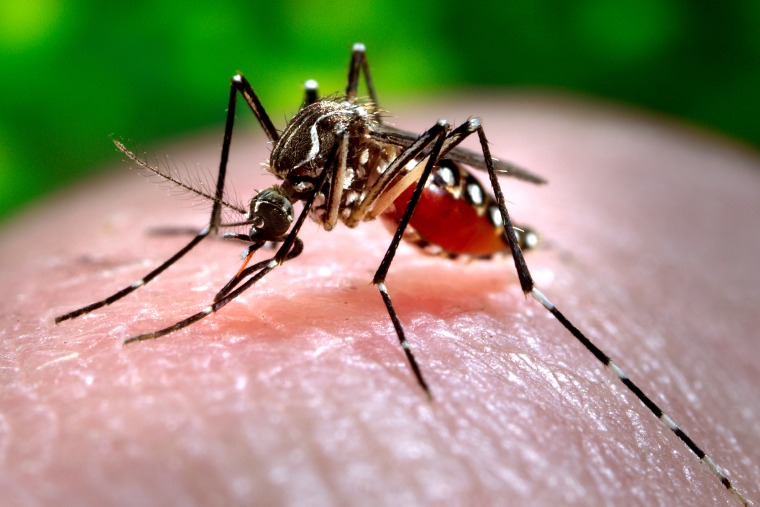A little-known virus new to the Americas is spreading and may be causing deadly birth defects, health officials say.
It's called Zika virus, and it's moving across much of Brazil and north into Central America, carried by the same mosquitoes that carry other viruses such as dengue and yellow fever.
Health officials thought Zika was pretty harmless, causing a pesky fever and muscle aches, but Brazilian health officials say it may be causing a birth defect called microcephaly, too. The Pan American Health Organization, an arm of the World Health Organization, has issued an alert about it.
Microcephaly can be caused by a number of syndromes and its main symptom is a smaller-than-usual brain and head. Viruses such as German measles, chickenpox or cytomegalovirus can cause it if the mother's infected during pregnancy, and there is no cure.
The rate of cases has doubled in Brazil this year over previous years, PAHO says. "As of 30 November 2015, 1,248 cases of microcephaly, including seven deaths, have been reported in 14 states of Brazil, which are under investigation," the organization said.
RELATED: Spike in health care spending not unexpected
"The number is increasing day by day," virologists Silvia Sardi and Gubio Soares Campos of Brazil's Federal University of Bahia, who have been tracking the virus, said in an email to NBC News.
"It is becoming a serious problem, principally in poor areas, where the control of mosquitoes is a hard task," they added.
"From what I understand there very definitely is something significant going on with microcephaly," Dr. Ann Powers, a viral specialist at the Centers for Disease Control and Prevention, which is helping with the investigation.
But just because two things are going on at the same time does not necessarily mean they are connected.
"We want to be sure that there is very sound scientific information to show whether there is a link or not because we don't want people worrying unnecessarily," Powers told NBC News.
"We know that there has been a huge increase in the number of cases of microcephaly. We know that Brazil has had Zika as well. We are not certain of the overlap."
There is a little evidence, PAHO says. Tests of two pregnant women suggested the virus was in their amniotic fluid - the warm bath that cushions unborn babies inside the mother. Ultrasound had suggested the babies had microcephaly.
Over the past year or so Zika's been circulating in French Polynesia, as well, and health authorities there found an unusual increase in defects in the brains and spines of unborn and newborn babies. "The French Polynesia health authorities hypothesize that Zika virus infection may be associated with these abnormalities if mothers are infected with the virus during the first or second trimester of pregnancy," PAHO said.
Zika had not normally been thought to cause serious illness. While it's commonly seen in Africa, the south Pacific and parts of Asia, it has only recently come to South America, via Chile's Easter Island. Now it's been seen in El Salvador, Guatemala, Mexico, Paraguay, Suriname, and Venezuela.
RELATED: Gene editing gets easier as experts discuss fears
And it's killed at least three people, Brazil's Ministry of Health says: a man who was healthy except for having had lupus, a healthy 16-year-old-girl, and a newborn with microcephaly. If these deaths are confirmed, they'd be the first ever attributed to Zika.
CDC says only about one in five people infected with Zika virus become ill and the most common symptoms are fever, rash, joint pain, or red eyes. "Other symptoms include muscle pain, headache, pain behind the eyes, and vomiting," CDC says.
However, the virus is difficult to test for, Powers said, and can be mixed up with dengue, a similar virus, which can be fatal.
"There is a lot we don't know about this virus. It hasn't until the last few years been a significant human pathogen," she said.
The good news is that people don't infect one another - the Aedes aegypti mosquito, which lives in tropical regions, carries it. The Zika virus doesn't appear to infect animals, which means it's less likely to spread than, say, West Nile virus,which infects birds and which spread across all of the Americas in just a few years after it was first introduced in 1999.
So now Zika has joined chikungunya and dengue as viruses to avoid in areas where Aedes aegypti live - which includes much of central and south America, with the occasional cases also in south Florida and south Texas, as well as Hawaii.
"If you are traveling to an area where there known transmission, take precautions to avoid mosquito bites," Powers advised. Those precautions include using insect repellants such as DEET - which CDC says is safe for pregnant women to use - wearing long pants and sleeves and staying indoors behinds screens.
This story originally appeared on NBCNews.com
